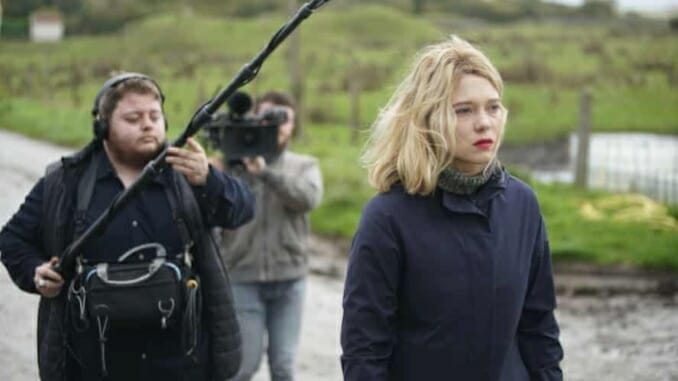Bruno Dumont’s France Murkily Scrutinizes Journalistic Folly

French filmmaker Bruno Dumont is nothing if not a provocateur. His work consistently pushes boundaries, often experimenting with vastly different genres in order to toy with baked-in visual and narrative conventions. Whether he’s operating within a musical, comedy, biopic, horror or coming-of-age film, Dumont’s gaze is always exacting and undeterred, highlighting the oft-ugly (and never easily digestible) intricacies of humanity. Perhaps this is why his films are generally so divisive, and undoubtedly why his latest, the newsroom satire France, will have its equal share of detractors. Though the film is a logical addition to Dumont’s existing filmography—with an emphasis on the hideous reality of war, yet not without humor—it is nonetheless hindered by its enigmatic aura, never quite elucidating the basis for its satirical lens.
Eponymous news anchor France de Meurs (Léa Seydoux) is one of the most nationally beloved figures in la République, with hoards of devoted fans stopping her on the streets of Paris in search of selfies. She hosts a roundtable debate program that delves into hot-button issues—though the fervent conviction of each guest quickly dissipates when the camera cuts. This is, essentially, the crux of France’s sprawling critique: The very orchestrators of “newsworthiness” couldn’t actually give a shit about the material conditions of the perils they cover. This is constantly explored through France’s own reportage, which often takes her to war-torn countries “aided by” the French military in their quest to quash Daesh, where she stages shots (or perhaps more poignantly, establishes mise en scène) to best position herself in the midst of conflict. You see, the stories she covers never merit exposure through their human interest and political pull alone—rather how her presence and persona can benefit from the suffering of others. Literally named France and often uselessly traversing dangerous landscapes that her namesake aided in destabilizing, the (post-)colonial irony of her newscasts doesn’t take much effort to notice. However, France doesn’t merely fix its focus here—there are several plot twists that add sensationalist intrigue to France’s personal life (and tabloid image) that make the viewer just as guilty of begging for titillation as the celebrity-poisoned populace the film denounces.
While Seydoux’s performance is riveting, there’s a layer of impenetrability to the character that hobbles the film as both an effective social satire and melodrama parody. As France progresses, France’s emotions rarely leave her face—grief, exasperation and, more often than not, outright sobs of anguish—yet a certain sense of interiority is never established. She simply seems to go through the motions, her personality only discernible when performed for an audience. This works well enough when it’s solely depicting France’s participation in the celebrity media machine, but feels frustrating and misplaced when the narrative shifts toward her personal dilemmas. For this reason, there’s also no reason for anyone to identify or sympathize with France, making her a familiar yet ultimately untouchable avatar to the viewer—likely how she also appears to her fictitious fans.
-

-

-

-

-

-

-

-

-

-

-

-

-

-

-

-

-

-

-

-

-

-

-

-

-

-

-

-

-

-

-

-

-

-

-

-

-

-

-

-








































